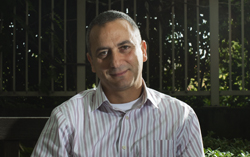FALL 2012 CONTENTS
Home
Bottom line
Medicine's Funding Pool is Drying Up
The competition
On the hunt for research dollars
Against the odds
A band of rebels fights to save health care
Giving well
Philanthropists roll up their sleeves
Melinda Gates on family matters
A conversation about contraception
Testing testing
Why some cancer screenings stir such controversy

DOWNLOAD PRINTABLE
ISSUE (PDF)


PGTeaming with parents of kids with autism
Pediatric psychiatrist Antonio Hardan, MD, who studies and treats children with autism, is driven in his work by a sense of awe — for his patients’ parents.
Photograph by Jamie Kripke

Antonio Hardan tested a nutritional supplement as an autism treatment and found signs it works.
Children with autism have language and social interaction deficits, and perform repetitive or stereotyped behaviors. Sixty to 70 percent also display what their doctors call irritability. “We’re not talking about mild things: This is throwing, kicking, hitting, the child needing to be restrained,” says Hardan, an associate professor of psychiatry and behavioral sciences at Stanford and director of the Autism and Developmental Disabilities Clinic at Lucile Packard Children’s Hospital.
Over and over, Hardan has seen moms and dads react with grace and love to behaviors that would tax even the most patient of souls. He has watched parents make huge sacrifices of time, energy and money to get their children the help they need. “It’s life-changing, seeing what these families go through,” he says.
What he sees motivates Hardan to cast a wide net in searching for new autism treatments. It was a parent’s idea, for instance, that instigated a recent Stanford pilot trial testing the efficacy of a dietary supplement — the antioxidant N-acetylcysteine, or NAC — for autism symptoms.
“NAC is being used by community practitioners who focus on alternative, non-traditional therapies,” Hardan says. “But there is no strong scientific evidence to support its use. Somebody needs to look at it.”
So, with funding donated by another parent, Hardan’s team carried out a small study involving 31 children. The results were encouraging: NAC lowered irritability and reduced children’s repetitive behaviors. Though Hardan is cautious about the results, stressing that they need to be replicated in larger trials before NAC is recommended for autism, he also sees potential advantages to NAC treatment.
Currently, doctors prescribe second-generation antipsychotics to treat irritability and other “side” features of autism like mood swings and aggression. These drugs cause serious side effects, including weight gain, involuntary motor movements and metabolic syndrome, which increases diabetes risk. By contrast, NAC’s side effects are generally mild, with gastrointestinal problems such as constipation, nausea, diarrhea and decreased appetite the most common.
In the study, the results of which were published June 1 in Biological Psychiatry, children with autism received either a placebo or NAC for 12 weeks — 900 mg daily for four weeks, then twice daily for four weeks and finally three times daily for the last four weeks. NAC treatment decreased irritability scores from 13.1 to 7.2 on the Aberrant Behavior Checklist, a widely used clinical scale for assessing irritability. The change is not as large as that seen in children taking antipsychotics. “But this is still a potentially valuable tool to have before jumping on these big guns,” Hardan says. In addition, children taking NAC showed a decrease in repetitive and stereotyped behaviors, which lack effective treatment.
Hardan’s team is now seeking NIH funds to re-examine NAC in a large, multicenter trial. A crucial piece of their application is the pilot data that came from a parent’s idea — and Hardan’s willingness to try it. Without that combination, the research would never have gotten off the ground.
— Erin Digitale

